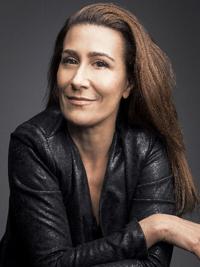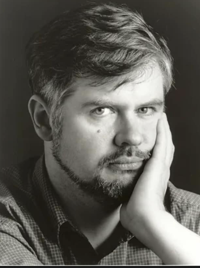
The first-ever national tour of the celebrated Broadway musical “Kimberly Akimbo” is officially launching in Denver on Thursday, and for one very funny reason: Playwright David Lindsay-Abaire takes notes when his pals are being very funny.
“I asked a friend how his new baby niece was, and he said, ‘Oh, she’s amazing. But it’s weird. She’s like this old woman trapped in a baby’s body,’” the Pulitzer Prize-winner told the Denver Gazette. “I thought, ‘Well, that’s an odd thing to say.’ But also, what a theatrical thing – an old woman in a child’s body.’
“And then I thought, ‘Well, maybe I can put that on stage.’”
He did, way back in 2001. But he made the baby a suburban New Jersey teenager with a real but rare genetic disorder that causes her body to age much more rapidly than it should.
So the play is really built around a single visual pun: Kimberly has the appearance of a grandmother, but underneath she’s just a normal 16-year-old kid with a hard crush on a young anagram hobbyist and amateur tuba player named Seth. (“And I will confess,” Lindsay-Abaire says, “that the Seth character is the closest that I’ve ever come to putting myself on stage.”)

David Lindsay-Abaire: “I was an outsider just as much as Kimberly, but I don’t think that was uncommon. We all felt like outsiders.”
All Kimberly wants from her infantile parents is discipline, occasional vegetables and a swear jar. Instead, they behave like overgrown children who already have given Kimberly up for dead.
It’s an upside-down, chaotic world – hence, the title of the play. “Akimbo” is not Kimberly’s last name – that’s Levaco. Akimbo means “flung out haphazardly.”
In other words, things in this world are way out of joint. As they atypically are in Lindsay-Abaire’s wildly original plays that are often surreal and always infused with heart. I once described the author’s playwriting world as violent and scary, but also farcical and funny, as if seen through the snickering eyes of an 8-year-old. His stories are often grounded in pain and trauma and serious issues – but, boy, are they fun.
To fully understand the world of “Kimberly Akimbo,” which the playwright adapted into the Tony Award-winning Best Musical of 2023 with composer Jeanine Tesori, you have to understand the world of Lindsay-Abaire, who grew up in South Boston, the son of a factory worker and a fruit peddler.
“I was an outsider just as much as Kimberly, but I don’t think that was uncommon,” he said. “We all felt like outsiders.
“I grew up very working class, and so – how do you even talk about this? – like, really horrible things happened in my family and to my neighbors. And we often dealt with those horrible things through comedy. I was a total oddball and a stranger to parents who loved me but didn’t understand me at all, nor I them.
“I wasn’t overtly writing about my family when I wrote ‘Kimberly Akimbo,’ but now, with the lens that I have, I can’t not think of my family when I watch it. So yeah, there’s definitely a lot more of me in this play than I realized when I wrote it. If I were more aware of that, I probably never would have written it.”

From left: Nina White, Michael Iskander, Fernell Hogan and Olivia Hardy from the original Broadway company of ‘Kimberly Akimbo,’ which won five 2023 Tony Awards including Best Musical. A new national touring production with a new cast will launch in Denver on Sept. 26 at the Buell Theatre.
Lindsay-Abaire’s plays are so vastly different, yet so identifiably his own. “Fuddy Meers” is a freaky screwball comedy about a woman who wakes each morning as a blank slate. In the black comedy “A Devil Inside,” a mother has waited 14 years to tell her son that his 400-pound dead father was actually murdered, disembodied and thrown into a drainage ditch. In “Wonder of the World,” a wife discovers her husband’s dirty little secret and flees in search of the life she thinks she missed out on. Simply put: He writes about the things that scare us most in the world. Then makes us laugh at them.
Tesori, in an NPR interview, described Lindsay-Abaire’s tone as “the humor of coping” – something that caught him a bit off-guard hearing.

Composer Jeanine Tesori has won five Tony Awards.
“Is that true?” he said. “Yeah, I guess it is. Honestly, I’ve always mixed comedy and drama in my plays, so my funnier plays are often grounded in pain and trauma – and my more serious plays, like ‘Rabbit Hole’ (his Pulitzer Prize-winner about young parents (not) coping with the death of their 4-year-old) still have lots of humor running through them. People have told me, ‘I didn’t think I would laugh so much at that play about grieving parents. I think that sensibility was baked into me from an early age. I think humor is a coping mechanism. It’s this idea of something being so awful that you just have to laugh at it.”
One other commonality in every last Lindsay-Abaire play is an array of fresh and fully fleshed female characters, often of a certain age. In this era when playwrights are being challenged – perhaps even threatened – to write characters only from their own authentic experience, Lindsay-Abaire, a married father, continues to create roles for female actors who are largely forgotten into the 40s. He just seems to know these women he creates in his bones – perhaps because, in large part, those are his own bones.
“It’s an interesting question because I’m not consciously thinking about gender when I’m writing plays, and I never have,” he said. “But, also not consciously, I think I’m almost always writing about myself.
“I will also say that my mother was an incredible storyteller and a hilarious person, and she was the center of every family event telling amazing stories and making people laugh. I was always surrounded by incredibly soulful, funny women who told stories. But really I think it has more to do with the fact that I know bucketloads of tremendously talented actresses, and I want to create parts for them.
“When I start a play, I do ask myself, ‘Does it matter whether the character is a man or a woman? Because if it doesn’t matter, then I automatically make that character a woman, just because there are so few roles, especially for older women – and they are my favorite actors. There are enough parts for older guys – and for all guys, honestly.”
To adapt or redact?
Lindsay-Abaire’s writing path has often crisscrossed with adaptations. In 2008, he paired with Tesori to turn the megahit DreamWorks film “Shrek” into “Shrek the Musical” (one they revised and re-launched just this past February.) In 2010, he adapted “Rabbit Hole” into a film.
The inspiration to turn “Kimberly Akimbo” into one of the most unlikely Broadway musicals of all-time, he said, was purely Tesori’s. With a body of work spanning “Thoroughly Modern Millie” to “Fun Home,” Tesori is considered the most honored female composer in history.
But here’s the thing, Lindsay-Abaire says: “Most plays don’t make good musicals.” Truth.
“We had worked on ‘Shrek’ together, and that was a really difficult process for lots of reasons: It’s a big, famous film, and there were movie producers with lots of notes about how to turn it into a musical.
“But the easiest part was working with Janine. And so when that finished up, I said, ‘Gosh, I’d love to write another musical with you – but I wish we could write it the way that I write my plays, where nobody else is getting up in there, and it can be bad for as long as it needs to be bad, until I figure it out eventually.’
“And Jeanine said, ‘Well, great. Why not adapt one of your plays?’ – which is not what I had in mind. Then she pulled ‘Kimberly Akimbo’ off the shelf and said, ‘This has such a big, throbbing heart in the middle of it.’ And what musicals do best is crack open characters’ hearts and let them sing and tell an audience what their internal lives are. And these characters all have such complicated internal lives. I think it lends itself to a musical in a way that a lot of plays don’t.”
They added four characters and a show choir, he said, “just to expand the world – and also to help tell Kimberly’s story.”
“Kimberly Akimbo” – the title or the play – might not be immediately familiar to Denver Center audiences who attend the launch of the DCPA’s 2024-25 Broadway season. But the stage play has been a regular offering for local theatergoers, with at least six Colorado companies staging the play over the past 20 years.
For them, Lindsay-Abaire promises, “The spirit of the play is still very much the spirit of the musical – and honestly, Janine was responsible for that,” he said. “I was very excited by the idea of going off in different directions but Jeanine was always like, ‘Yes, but don’t forget this,’ and, ‘Hold onto that,’ and, ‘We can’t throw this out, David. This is a thing that holds the play together.’
“And so, while there are lots of differences – obviously it’s full of songs and people communicating through lyrics instead of through dialogue – but the tone and the humor and the heart of the musical are hopefully the same.
But what Jeanine’s music does that a straight play generally cannot is to make the emotion much more accessible. When a cello does a certain thing and hits a certain note, you feel your heart open and your eyes well up, and you don’t even know why it’s happening. That’s the magic of music.
So the musical, he says, “is a different experience that it just cracks you open in a way that the play doesn’t always.”

The original Broadway company of ‘Kimberly Akimbo,’ which won five 2023 Tony Awards including Best Musical.’ A new national touring production with a new cast will launch in Denver on Sept. 26 at the Buell Theatre.
Opening in Denver
Every new national tour has to start somewhere, but landing any launch is a competitive race, and Denver often comes out on top, with a list of credits spanning “The Lion King,” “The Book of Mormon” and “Pippin.” Lindsay-Abaire, who will be attending Thursday’s opening, says “it’s thrilling” for “Kimberly Akimbo” to premiere in Denver.
“Denver is an amazing city for the arts, with really astute audiences, and that’s how we want to launch it – with people who will appreciate the show and are excited to see it. We’re excited to go to every city, of course, but the Denver arts scene is remarkable compared to most other cities in the country.”
What he most wants those who come to know, he said: It’s funny. For real.
“At the same time, yes, it’s also incredibly sad and emotional, and the show rides that rollercoaster from the beginning to the very end,” he said. “I would say if people want to have that kind of experience where they’re laughing and suddenly their breath is taken away because something so painful has happened, that’s what this musical is.
“At the end of the day, it really does feel like ‘Kimberly Akimbo’ is about doing the most with the time we have left – whatever that amount of time is.”

From left: Nina White, Bonnie Milligan, Fernell Hogan, Michael Iskander and Olivia Hardy from the original Broadway company of ‘Kimberly Akimbo,’ which won five 2023 Tony Awards, including Best Musical. A new national touring production with a new cast will launch in Denver on Sept. 26 at the Buell Theatre.
Bonus: On the death of Christopher Durang
The most profound author influence on David Lindsay-Abaire was Christopher Durang, the master satirist and absurdly comic playwright whose works included “Beyond Therapy,” Sister Mary Ignatius Explains It All For You” and “The Actor’s Nightmare.” When Durang died on April 2, Lindsay-Abaire penned a tribute to his mentor for American Theatre magazine titled, “Christopher Durang was my Willy Wonka.”
“I wouldn’t be a playwright without Christopher,” Lindsay-Abaire told the Denver Gazette. I mean, let me just start there. At my high school, our ninth-grade play was ‘A History of the American Film,’ which was a musical that Chris Durang wrote.

An early look at playwright Christopher Durang, who died April 2, 2024.
“I knew a bunch of really wonderful plays like ‘Our Town’ and anything by Arthur Miller. But then to see a Christopher Durang play – that just cracked my mind open. I thought, ‘Oh, wow. Plays can be like this: Completely unhinged and angry and ridiculous and hilarious and sad and soulful and wonderful. And it just made me see theater in a completely different way.
“And then I read all of his plays, of course. And then, in the 10th grade, a classmate said, ‘You should write the play.’ And that’s how I became a playwright. Because someone said, ‘Go be a playwright.’ And then I wrote the 11th-grade play and the 12th-grade musical. And later I got into Julliard and actually got to study with Chris Durang.
“More than his work, just being around him as a human being – as a kind, generous, very funny, giving soul – made a deep impact on me. He just changed my life in ways that I can’t even speak about because they were so great.
“And so the idea that he’s no longer in the world writing his brilliant plays is deeply sad and a loss for us all.”















